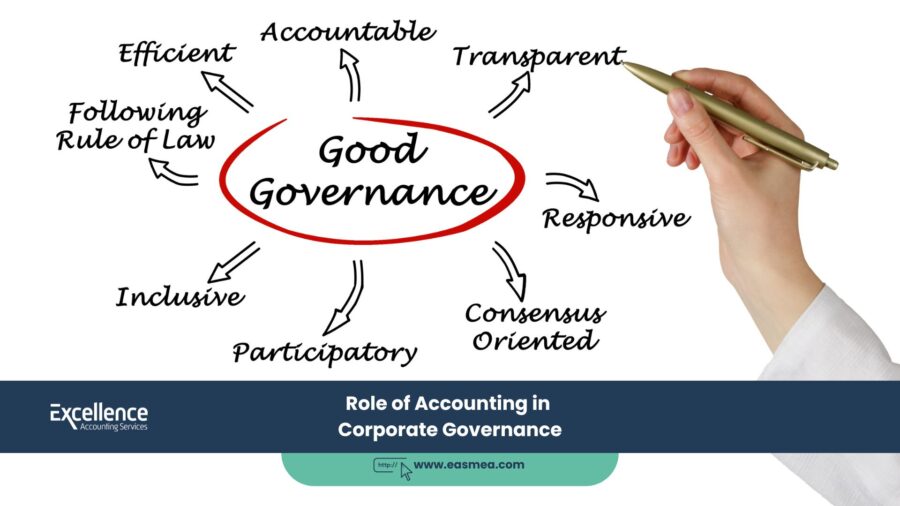In today’s dynamic business environment, corporate governance stands as a cornerstone of organizational integrity and stakeholder confidence. At the heart of effective governance lies accounting, a discipline that transcends mere number crunching to become a pivotal instrument for transparency, accountability, and ethical conduct. This post delves into the multifaceted role of accounting in shaping sound corporate governance, exploring its impact on financial reporting, risk management, and overall organizational health. We will explore how proper accounting practices can enhance any business, and how businesses can utilize excelent accounting services to achieve this.
- Understanding Corporate Governance and the Role of Accounting
- The Foundational Role of Financial Accounting in Governance
- Accounting's Contribution to Transparency and Accountability
- Accounting for Risk Management and Compliance
- The Impact of Accounting on Stakeholder Confidence
- Best Practices and Future Trends in Accounting and Governance
- What Excellence Accounting Services Can Offer
- Frequently Asked Questions (FAQ)
- Conclusion: The Indispensable Link Between Accounting and Corporate Governance
- Strengthen Your Corporate Governance with Excellence Accounting Services
Key Takeaways:
- Accounting provides the foundational framework for corporate governance through accurate financial reporting.
- Transparency and accountability, vital governance principles, are directly bolstered by sound accounting practices.
- Effective risk management and regulatory compliance rely heavily on robust accounting systems.
- Stakeholder confidence is significantly influenced by the transparency and ethical practices facilitated by accounting.
- Understanding the interplay between accounting and governance is crucial for organizational success.

Understanding Corporate Governance and the Role of Accounting
Corporate governance is the system of rules, practices, and processes by which a company is directed and controlled. It essentially involves balancing the interests of a company’s many stakeholders, such as shareholders, management, customers, suppliers, financiers, government, and the community. Proper corporate governance is necessary to ensure that the company is managed in a responsible and ethical manner. Accounting acts as the language of business, translating complex financial transactions into clear, understandable information that stakeholders can use to make informed decisions.
Effective corporate governance ensures that companies operate transparently and ethically, fostering trust among stakeholders. Accounting plays a crucial role in this process by providing accurate and reliable financial information. This information is essential for stakeholders to assess the company’s financial health and make informed decisions. Furthermore, accounting practices ensure that companies comply with relevant regulations and standards, promoting accountability and preventing financial misconduct.
Core Principles of Corporate Governance and Accounting’s Impact
Corporate governance rests on principles like transparency, accountability, fairness, and responsibility. Accounting directly supports these principles through accurate financial reporting and rigorous internal controls. For instance, transparent financial statements, prepared in accordance with established accounting standards, allow stakeholders to evaluate a company’s performance and risk profile. Moreover, robust internal controls, such as segregation of duties and regular audits, ensure that financial data is reliable and protected from manipulation.
Accounting standards such as Generally Accepted Accounting Principles (GAAP) or International Financial Reporting Standards (IFRS) provide frameworks that dictate how financial information is recorded and presented. This standardization ensures that financial statements are comparable across different companies, facilitating informed decision-making by investors and other stakeholders. Additionally, accounting plays a vital role in ensuring that companies adhere to regulatory requirements, such as those related to taxation and financial reporting.
The Relationship Between Financial Reporting and Corporate Governance
Financial reporting is the process of communicating a company’s financial performance and position to stakeholders. It provides the essential information that stakeholders need to assess the company’s financial health, make investment decisions, and hold management accountable. Corporate governance, on the other hand, sets the framework for how a company is managed and controlled. Accounting, through its role in financial reporting, becomes a critical component of corporate governance.
The integrity of financial reporting is critical to effective corporate governance. Accurate and transparent financial statements enable stakeholders to evaluate a company’s performance and risk profile. Moreover, robust internal controls, such as segregation of duties and regular audits, ensure that financial data is reliable and protected from manipulation. Accounting standards such as GAAP or IFRS provide frameworks that dictate how financial information is recorded and presented, ensuring comparability and reliability.
The Foundational Role of Financial Accounting in Governance
Financial accounting forms the bedrock of corporate governance by providing the essential data that stakeholders rely on for decision-making. Accurate financial statements, prepared in accordance with established standards, offer a clear picture of a company’s financial health. This transparency builds trust and confidence among investors, creditors, and other stakeholders. The quality of financial information can directly affect the strength of a corporation’s governance.
Effective financial accounting practices are essential for maintaining transparency and accountability within an organization. Accurate and reliable financial statements provide stakeholders with a clear understanding of the company’s financial performance, enabling them to make informed decisions. Moreover, robust internal controls ensure that financial data is protected from manipulation and fraud, further enhancing the integrity of the governance process.
The Significance of Accurate Financial Reporting
Accurate financial reporting is crucial for maintaining trust and transparency. It allows stakeholders to assess a company’s financial performance, evaluate its risks, and make informed decisions. Inaccurate or misleading financial reports can lead to significant consequences, including loss of investor confidence, legal penalties, and damage to the company’s reputation.
| Feature | Accurate Financial Reporting | Inaccurate Financial Reporting |
|---|---|---|
| Stakeholder Confidence | High | Low |
| Investor Trust | Strong | Weak |
| Legal Compliance | Ensured | Risk of penalties |
| Company Reputation | Positive | Damaged |
| Decision-Making | Informed | Misinformed |
Key Components of Financial Statements and Their Governance Relevance
Financial statements, including the balance sheet, income statement, and cash flow statement, provide a comprehensive overview of a company’s financial position and performance. The balance sheet reflects a company’s assets, liabilities, and equity at a specific point in time. The income statement shows the company’s revenues and expenses over a period. The cash flow statement details the company’s cash inflows and outflows. All these data points are critical for stakeholders.
- Balance Sheet: Provides a snapshot of the company’s financial position at a specific point in time, showing assets, liabilities, and equity.
- Income Statement: Reports the company’s financial performance over a period, showing revenues, expenses, and net income.
- Cash Flow Statement: Details the company’s cash inflows and outflows, providing insights into its liquidity and financial health.
Accounting’s Contribution to Transparency and Accountability
Transparency and accountability are fundamental principles of good corporate governance. Accounting plays a vital role in promoting these principles by ensuring that financial information is accurate, reliable, and accessible to stakeholders. Through effective accounting practices, companies can build trust and confidence among investors, creditors, and the public. Transparency is achieved by the clear and open communication of financial information. Accountability is enhanced by the systems and procedures that allow stakeholders to hold management responsible for their financial decisions.
Accounting practices that enhance transparency include the disclosure of relevant financial information in a clear and understandable manner. This includes providing detailed explanations of financial statements, disclosing related party transactions, and providing information about off-balance-sheet activities. Accountability is enhanced by the implementation of robust internal controls, such as segregation of duties, regular audits, and independent oversight.
How Accounting Practices Promote Transparency
Accounting practices promote transparency by ensuring that financial information is presented in a clear, consistent, and understandable manner. This includes the use of standardized accounting principles and the disclosure of relevant financial data. Transparency is essential for building trust and confidence among stakeholders.
- Standardized Reporting: Using GAAP or IFRS ensures comparability.
- Detailed Disclosures: Explaining financial statement line items.
- Regular Audits: Independent verification of financial data.
- Accessible Information: Making financial reports available to stakeholders.
Ensuring Accountability to Stakeholders Through Accounting
Accountability is a cornerstone of corporate governance. Accounting ensures accountability by providing the mechanisms for stakeholders to hold management responsible for their financial decisions. This includes the implementation of robust internal controls, regular audits, and clear lines of responsibility.
- Accounting systems track financial transactions and provide evidence of how resources are used.
- Audits verify the accuracy and reliability of financial information.
- Internal controls prevent fraud and errors, ensuring accountability.
- Financial reporting provides stakeholders with the information they need to assess management’s performance.
Accounting for Risk Management and Compliance
Effective risk management is essential for ensuring the long-term sustainability of a company. Accounting plays a crucial role in identifying, assessing, and mitigating financial risks. By providing accurate and timely financial information, accounting enables management to make informed decisions and take proactive measures to address potential risks. Accounting also plays a vital role in ensuring that companies comply with relevant laws and regulations, reducing the risk of legal penalties and reputational damage.
Accounting systems provide the data needed to assess financial risks, such as liquidity risk, credit risk, and market risk. By analyzing financial data, management can identify potential vulnerabilities and take steps to mitigate them. Additionally, accounting plays a key role in ensuring regulatory compliance by providing the information needed to meet reporting requirements and adhere to relevant standards.
Identifying and Mitigating Financial Risks Through Accounting
Accounting plays a vital role in identifying and mitigating financial risks. By providing accurate and timely financial information, accounting enables management to make informed decisions and take proactive measures to address potential risks. This includes identifying risks related to liquidity, credit, and market fluctuations.
Ensuring Regulatory Compliance and Ethical Practices
Accounting is pivotal in ensuring companies comply with financial regulations and uphold ethical standards. This includes adhering to accounting standards, tax laws, and industry-specific regulations. Robust accounting systems and internal controls are essential for preventing financial misconduct and maintaining the company’s integrity.
- Accurate record-keeping and reporting are essential for regulatory compliance.
- Internal audits help detect and prevent fraud and errors.
- Ethical accounting practices build trust with stakeholders and enhance the company’s reputation.
- Compliance with tax laws and financial reporting standards is mandatory.
The Impact of Accounting on Stakeholder Confidence
Stakeholder confidence is a critical factor in a company’s success. Accurate, transparent, and ethical accounting practices build trust among investors, creditors, employees, and the public. This trust enhances the company’s reputation, attracts investment, and fosters long-term relationships. Conversely, financial misconduct or lack of transparency can severely damage stakeholder confidence and lead to significant consequences.
By providing reliable financial information, accounting enables stakeholders to make informed decisions and assess the company’s performance. Furthermore, ethical accounting practices demonstrate the company’s commitment to integrity and accountability, further enhancing stakeholder confidence.
Building Trust with Investors and Stakeholders
Accounting plays a fundamental role in building trust with investors and stakeholders. Accurate and transparent financial reporting demonstrates the company’s commitment to integrity and accountability. This transparency allows investors to assess the company’s financial health, make informed decisions, and have confidence in their investments.
- Consistent and reliable financial reporting builds investor confidence.
- Disclosure of relevant financial information enhances transparency.
- Independent audits provide assurance of financial accuracy.
- Ethical accounting practices demonstrate integrity and build trust.
The Ethical Role of Accounting in Corporate Governance
Ethical accounting practices are essential for maintaining the integrity of corporate governance. Accountants have a responsibility to act with integrity, objectivity, and professionalism. This includes adhering to ethical codes of conduct and ensuring that financial information is accurate and reliable.
“Ethical accounting is not just about following rules; it’s about upholding the highest standards of integrity and professionalism.”
Best Practices and Future Trends in Accounting and Governance
To maximize the benefits of accounting in corporate governance, companies must adopt best practices and stay abreast of emerging trends. This includes implementing robust internal controls, utilizing technology to enhance efficiency and transparency, and fostering a culture of ethical conduct.
The future of accounting and corporate governance will be shaped by technological advancements, evolving regulatory landscapes, and increasing stakeholder expectations. Companies that embrace these trends and adopt best practices will be better positioned to achieve long-term success.
Implementing Effective Accounting Practices for Good Governance
Implementing effective accounting practices is crucial for good corporate governance. This includes establishing robust internal controls, ensuring accurate financial reporting, and promoting transparency and accountability.
| Practice | Description | Benefit |
|---|---|---|
| Robust Internal Controls | Implementing systems to prevent fraud and errors. | Ensures data reliability and reduces risk. |
| Accurate Financial Reporting | Preparing financial statements in accordance with standards. | Builds stakeholder trust and enables informed decisions. |
| Transparency and Disclosure | Providing clear and accessible financial information. | Enhances accountability and promotes ethical conduct. |
| Regular Audits | Independent review of financial records. | Assures stakeholders of financial accuracy. |
Emerging Trends in Accounting and Corporate Governance
The landscape of accounting and corporate governance is constantly evolving. Emerging trends such as the use of artificial intelligence, blockchain technology, and sustainability reporting are shaping the future of the profession.
- Artificial Intelligence (AI): AI can automate accounting processes, improve accuracy, and enhance risk management.
- Blockchain Technology: Blockchain can enhance transparency and security in financial transactions.
- Sustainability Reporting: Companies are increasingly disclosing their environmental, social, and governance (ESG) performance.
- Enhanced Data Analytics: Using data analytics to gain deeper insights into financial performance and risk.
What Excellence Accounting Services Can Offer
Excellence Accounting Services is dedicated to providing comprehensive accounting solutions that enhance corporate governance. We offer a range of services designed to ensure accuracy, transparency, and compliance.
- Financial Reporting and Analysis: We provide accurate and timely financial reports, helping you make informed decisions.
- Internal Control Assessments: We evaluate and strengthen your internal controls to mitigate risks and ensure compliance.
- Audit Support: We assist with audits, ensuring that your financial records are accurate and reliable.
- Compliance and Regulatory Guidance: We help you navigate complex regulatory requirements and ensure compliance.
- Consulting Services: We offer guidance on best practices in accounting and governance.
- Data Analysis: We provide deep dives into your data, so that you can make the best most informed decisions.
By partnering with Excellence Accounting Services, you can strengthen your corporate governance and build trust with your stakeholders.
Frequently Asked Questions (FAQ)
Conclusion: The Indispensable Link Between Accounting and Corporate Governance
In conclusion, accounting plays an indispensable role in corporate governance. It provides the foundation for transparency, accountability, and ethical conduct, which are essential for building stakeholder confidence and ensuring long-term sustainability.
By implementing robust accounting practices, companies can strengthen their governance framework, mitigate risks, and enhance their reputation. As the business landscape continues to evolve, the importance of accounting in corporate governance will only grow, making it a critical area of focus for organizations worldwide.




